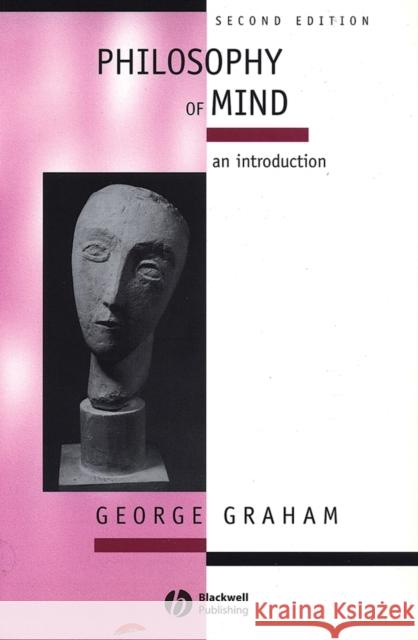Philosophy Mind Introduction » książka



Philosophy Mind Introduction
ISBN-13: 9780631205418 / Angielski / Miękka / 1998 / 288 str.
Philosophy Mind Introduction
ISBN-13: 9780631205418 / Angielski / Miękka / 1998 / 288 str.
(netto: 194,56 VAT: 5%)
Najniższa cena z 30 dni: 203,03
ok. 30 dni roboczych
Dostawa w 2026 r.
Darmowa dostawa!
Philosophy of Mind: An Introduction is a lively and accessible introduction to one of philosophy's most active and important areas of research.
"Its prose is lucid and its examples lively and often humorous. For the breadth of its topics, the attractiveness of its imaginative examples, and its remarkable textual clarity, this would be a splendid text to use." Philosophical Books
"Wonderful. I highly recommend it both as an introductory text and as a philosophical work in its own right." Philosophical Psychology
Preface to the Second Edition.
Acknowledgements.
Part I: What is Philosophy of Mind?: .
1.1 Beginning Definitions, Elementary Ideas.
1.2 Color in Black and White.
Part II: Death and Identity:.
2.1. Christianity and the Problem of Survival.
2.2. The After–Death Experience.
2.3. Dissent from After Death.
2.4. The Idea of ′Personal Identity′.
2.5. Glorifying the Afterlife.
2.6. Solace and Annihilation.
Part III: The Problem of Other Minds:.
3.1. The Loneliness of Skepticism.
3.2. How Not to Solve the Problem of Other Minds.
3.3. How to Solve the Problem of Other Minds.
3.4. Other Minds and the Best Explanation Argument.
Part IV: Mind and Belief in Animals:.
4.1. The Mental Community.
4.2. Optimism About Animal Belief.
4.3. Pessimism About Animal Belief.
4.4. The Challenge of Animal Belief.
4.5. Horse and Chimp.
Part V: Mind and Belief in Computers:.
5.1. Could a Computer Believe?.
5.2. Functionalism and Intentionality.
5.3. The Chinese Room Argument.
5.4. The Counter–Argument from Possibility.
5.5. The Counter–Argument from Intentional Anti–Realism.
5.6. Once More: Could a Computer Believe?.
Part VI: Mind and Belief in God:.
6.1. A Dilemma for St. Thomas.
6.2. Does God Possess Beliefs?.
6.3. Suffering and Love.
6.4. On Having It All.
Part VII: Rational Action:.
7.1. The Concept of ′Rational Action′.
7.2. Rationality Versus Irrationality.
7.3. Is Weakness of Will Unreasonable?.
7.4. Is Unselfish Action Impossible?.
Part VIII: Does Mind Depend Upon Brain?:.
8.1. Materialism.
8.2. Is Materialism Correct?.
8.3. Brentano′s Thesis.
8.4. Intentionality and Materialism.
8.5. Supervenience and Melancholia or Why Did Robert Schumann Starve Himself to Death?.
8.6. Explanation and Mind/Brain Supervenience.
Part IX: Inside Persons:.
9.1. A Question of Gender.
9.2. What Is It Like to Be a Person?.
9.3. Freedom and Explanation.
9.4. The Dilemma of Free Will.
9.5. Folk Psychology, Freedom, and Compatibilism.
9.6. Happy Ending.
Part X: Consciousness, Matter, and Morality:.
10.1. Consciousness Defined.
10.2. Six Roles of Consciousness.
10.3. Is Consciousness a Brain Process?.
10.4. Consciousness and Animal Liberation.
10.5. An Impossible Consciousness.
Part XI: Fear and Trembling:.
11.1. Consciousness Epiphenomenalism.
11.2. The Master Argument for Consciousness Epiphenomenalism.
11.3. Attacking the Master Argument.
11.4. Defeating the Master Argument.
11.4. The Intelligent Behavior Hypothesis.
11.6. The Divided Labor Hypothesis.
11.7. Criticism and Commitments.
11.8. Final Feeling.
Glossary.
A Philosophy of Mind Bookshelf.
Index.
George Graham is Professor and Chair of the Department of Philosophy, and Professor of Psychology, at the University of Alabama at Birmingham. He is co–editor (with William Bechtel) of A Companion to Cognitive Science (Blackwell Publishers, 1998), and (with N. Scott Arnold and Theodore M. Benditt) of Philosophy: Then and Now (also published by Blackwell, 1998).
Philosophy of Mind: An Introduction is a lively and accessible introduction to one of philosophy′s most active and important areas of research.
In this second edition, George Graham maintains the strengths, structure, and overall features of the first, but expands its scope, deepens the detail, and reinforces the student–oriented style and coverage. The book is aimed at readers with little or no background in philosophy and covers a broad range of issues. Included are such central topics as the mind/body problem, personal identity, consciousness, intentionality and freedom of the will, as well as others rarely included in elementary introductions such as "after–death experience", minds of animals and of God, folk psychology, mental illness, altruism, weakness of will and happiness.
The book begins with a crisp introduction to the nature of the philosophy of mind, and ends with a provocative discussion of the causal role of consciousness in depression and schizophrenia. It is supported by consideration of classical and contemporary figures ranging from St. Thomas Aquinas, Descartes and Hume to the Churchlands, Daniel Dennett, and John Searle.
It is the ideal text for a first course in philosophy of mind.
1997-2025 DolnySlask.com Agencja Internetowa
KrainaKsiazek.PL - Księgarnia Internetowa









